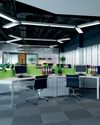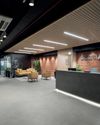
As environmental awareness is increasingly becoming a ruling factor in decision-making within many of the world’s largest organizations, companies and leaders are facing heavy pressure from different stakeholders, including the government and potential buyers, to reduce their carbon footprint and contribute positively to the environment. Within the real estate sector, organizations must integrate sustainability into their plans from the get-go. The growing impact of global warming, climate change, waste and air pollution have long become impossible to ignore with experts trying to find more eco-friendly ways to do business and “go green”.
For real estate developers, it is first and foremost an exercise in educating key stakeholders. Balancing design and facilities with sustainability, within a development, is not easy. Consumers may love sustainable developments but are mostly unwilling to create a home in a building that is not visually and practically appealing. Once that balance is met and the cost of entry is weighed against the overall brand and bottom-line benefits, it is an easier sell not only to the stakeholders but subsequently to the end-user.
Managing and reducing carbon footprints as part of a low carbon strategy, with its inherent cost benefits and revenue opportunities, is increasingly important in building design. Building green is one of the best strategies to modulate negative climate change because the technology to make substantial reductions in energy and CO2 emissions already exists and is not prohibitively expensive.
This story is from the September 2021 edition of Commercial Design.
Start your 7-day Magzter GOLD free trial to access thousands of curated premium stories, and 9,000+ magazines and newspapers.
Already a subscriber ? Sign In
This story is from the September 2021 edition of Commercial Design.
Start your 7-day Magzter GOLD free trial to access thousands of curated premium stories, and 9,000+ magazines and newspapers.
Already a subscriber? Sign In

WORKING TOGETHER
Professor Louise Valentine, Head of the Design School at Heriot-Watt University, on the importance of inclusive design in the workplace

WHERE CREATIVITY WORKS
Alhad Gore of Beyond Design Architects & Consultants brings his architectural expertise to life in the new office for Atul Patel Architects, blending functionality with creative flair to craft a workspace that inspires innovation and collaboration

FACILITATE INTELLIGENCE
How AI is redefining the future of facility management

DESIGNING A BETTER FUTURE
How inclusive office designs are shaping the modern workspace

ADDED VALUE
Is a good project manager the secret to success for a complex commercial design project?

RECOGNISING EXCELLENCE ACROSS THE SPECTRUM
The Grand Jury Meet of the third edition of Commercial Design Awards, a cornerstone event in India’s commercial design landscape, unfolded amidst the awe-inspiring expanse of the Welspun Global Carpet Plant in Hyderabad.

A VISION FOR 'TOTAL BUSINESS ECOSYSTEMS'
Jitu Virwani, Chairman and Managing Director of Embassy Group, redefines India's commercial real estate landscape by pioneering integrated, future-ready, and sustainable business ecosystems.

AWFIS TO DESIGN, MANAGE 165K SQ FT OFFICE SPACE FOR NSE IN MUMBAI
Awfis Space Solutions Limited on Tuesday said it will design and manage 1.65 lakh square feet of office space in Mumbai for the National Stock Exchange.

MACROTECH ACQUIRES 2.8 ACRES IN HINJEWADI
Realty developer Lodha, listed as Macrotech Developers, has acquired a 2.8acre plot of land in Pune's Hinjewadi area from Paranjape Schemes.

EMBASSY OFFICE PARKS REIT APPOINTS RITWIK BHATTACHARJEE AS INTERIM CEO
Embassy Office Parks REIT on Thursday appointed Ritwik Bhattacharjee as its interim Chief Executive Officer (CEO) with immediate effect, following Sebi’s order to suspend its CEO Arvind Maiya.